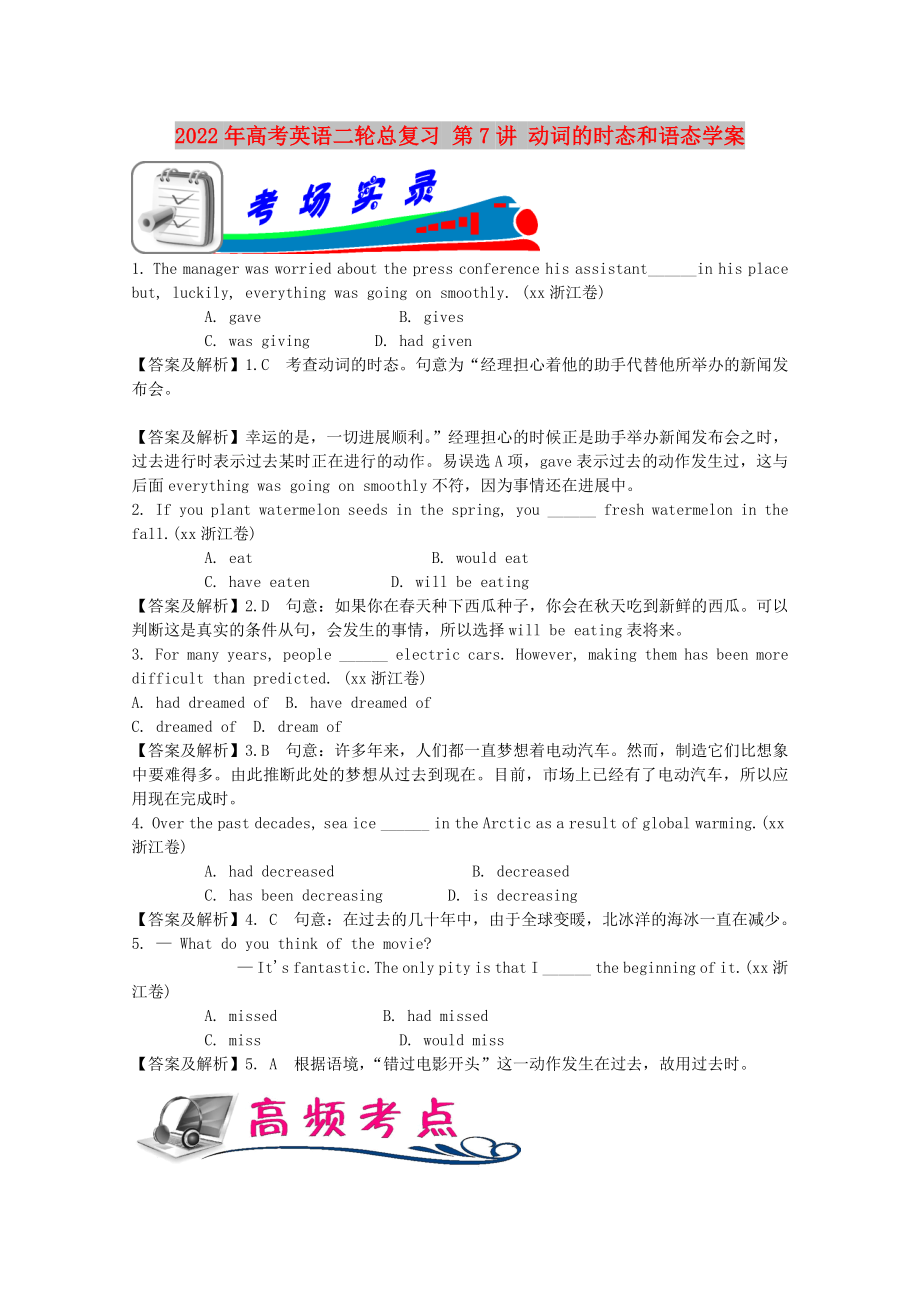《2022年高考英語二輪總復(fù)習(xí) 第7講 動(dòng)詞的時(shí)態(tài)和語態(tài)學(xué)案》由會(huì)員分享����,可在線閱讀,更多相關(guān)《2022年高考英語二輪總復(fù)習(xí) 第7講 動(dòng)詞的時(shí)態(tài)和語態(tài)學(xué)案(3頁珍藏版)》請?jiān)谘b配圖網(wǎng)上搜索�。
1、2022年高考英語二輪總復(fù)習(xí) 第7講 動(dòng)詞的時(shí)態(tài)和語態(tài)學(xué)案
1. The manager was worried about the press conference his assistant______in his place but, luckily, everything was going on smoothly. (xx浙江卷)
A. gave B. gives
C. was giving D. had given
【答案及解析】1. C 考查動(dòng)詞的時(shí)態(tài)��。句意為“經(jīng)理擔(dān)心著他的助手代替
2�、他所舉辦的新聞發(fā)布會(huì)。
【答案及解析】幸運(yùn)的是���,一切進(jìn)展順利����?��!苯?jīng)理擔(dān)心的時(shí)候正是助手舉辦新聞發(fā)布會(huì)之時(shí)���,過去進(jìn)行時(shí)表示過去某時(shí)正在進(jìn)行的動(dòng)作。易誤選A項(xiàng)�����,gave表示過去的動(dòng)作發(fā)生過��,這與后面everything was going on smoothly不符��,因?yàn)槭虑檫€在進(jìn)展中�。
2. If you plant watermelon seeds in the spring, you ______ fresh watermelon in the fall.(xx浙江卷)
A. eat B. would eat
3、 C. have eaten D. will be eating
【答案及解析】2. D 句意:如果你在春天種下西瓜種子�����,你會(huì)在秋天吃到新鮮的西瓜����。可以判斷這是真實(shí)的條件從句�����,會(huì)發(fā)生的事情�����,所以選擇will be eating表將來��。
3. For many years, people ______ electric cars. However, making them has been more difficult than predicted. (xx浙江卷)
A. had dreamed of B. have dreamed of
C. dream
4�����、ed of D. dream of
【答案及解析】3. B 句意:許多年來�,人們都一直夢想著電動(dòng)汽車�����。然而���,制造它們比想象中要難得多。由此推斷此處的夢想從過去到現(xiàn)在����。目前,市場上已經(jīng)有了電動(dòng)汽車�,所以應(yīng)用現(xiàn)在完成時(shí)。
4. Over the past decades, sea ice ______ in the Arctic as a result of global warming.(xx浙江卷)
A. had decreased B. decreased
C. has been decreasing
5��、 D. is decreasing
【答案及解析】4. C 句意:在過去的幾十年中�,由于全球變暖,北冰洋的海冰一直在減少�����。
5. — What do you think of the movie?
— It's fantastic.The only pity is that I ______ the beginning of it.(xx浙江卷)
A. missed B. had missed
C. miss D. would miss
【答案及解析】5. A 根據(jù)
6�����、語境�����,“錯(cuò)過電影開頭”這一動(dòng)作發(fā)生在過去����,故用過去時(shí)。
動(dòng)詞的分類
動(dòng)詞是表示動(dòng)作和狀態(tài)的詞�����。動(dòng)詞有時(shí)態(tài)�����、語態(tài)和語氣三種形式的變化��。
1.動(dòng)詞按其能否獨(dú)立作謂語而分為:“謂語動(dòng)詞”和“非謂語動(dòng)詞”兩種��。
2.動(dòng)詞的四種基本形式:動(dòng)詞原形�����、過去式�����、過去分詞和現(xiàn)在分詞。
3.動(dòng)詞按其構(gòu)成動(dòng)詞詞組的作用可分為:實(shí)義動(dòng)詞��、連系動(dòng)詞���、情態(tài)動(dòng)詞和助動(dòng)詞����。
(1)實(shí)義動(dòng)詞分為及物動(dòng)詞和不及物動(dòng)詞���。還可分為持續(xù)性動(dòng)詞和瞬間動(dòng)詞��;
(2)連系動(dòng)詞有兩種:一種表特征或狀態(tài)����,另一種表狀態(tài)變化過程����。
時(shí)態(tài)和語態(tài)
主動(dòng)語態(tài)和被動(dòng)語態(tài)
主動(dòng)語態(tài)(Active Voice ):在主動(dòng)語態(tài)
7、中���,主語是動(dòng)作的執(zhí)行者�����。如:
The student wrote a song.
被動(dòng)語態(tài)(Passive Voice): 在被動(dòng)語態(tài)中���,主語是動(dòng)作的承受者。如:
A song was written by the student.
主動(dòng)語態(tài)變被動(dòng)語態(tài)三步驟:
1. 原來的主語變?yōu)橘e語�,其前加“by”;
2. 原來的(直接)賓語提前作主語����;
3. 動(dòng)詞變?yōu)楸粍?dòng) be + 過去分詞(be要變化)
如: Millions_of_people will watch the_final_match_on TV.
→The final match will be watched
8、on TV by millions of people.
易錯(cuò)易混點(diǎn)
1. 被動(dòng)語態(tài)介詞固定搭配不能省略��。如:
He has thought_of a way of solving the problem.
→A way of solving the problem has been thought_of.
2. break out/ happen/ take place/ arrive/ bee/ die/ disappear, etc. 不及物動(dòng)詞沒有被動(dòng)語態(tài)�。如:
The accident which happen
9、ed yesterday surprised me.
3. 主動(dòng)語態(tài)表示被動(dòng)的若干情形����。
(1)某些連系動(dòng)詞用主動(dòng)表被動(dòng),如:look, sound, smell, taste, prove, feel����。
This kind of cloth feels soft.
My advice proved to be wrong.
(2)當(dāng)open, close, shut, lock, move等用作不及物動(dòng)詞且表示主語的某種屬性時(shí),通常用主動(dòng)形式表示被動(dòng)意義�。他們通常與can't, won't等連用。
The
10、 door won't shut.
(3)當(dāng)read, write, wash, sell, clean, cook, burn, draw, cut, wear等詞與well, easily, quickly 等副詞連用時(shí)�����,常用主動(dòng)表被動(dòng)�����。
The cloth washes well.
The poem reads smoothly.
(4)某些表示開始和結(jié)束的動(dòng)作(begin, start, finish, end, etc. )�,當(dāng)主語是物且不強(qiáng)調(diào)動(dòng)作的執(zhí)行者時(shí),可用主動(dòng)表被動(dòng)���。
The play ended
11�����、at ten o'clock.
4. 非謂語動(dòng)詞主動(dòng)表被動(dòng)的情況��。
(1)不定式to blame, to let用作表語時(shí)�����,通常用主動(dòng)表被動(dòng)��。
Who is to blame? 該怪誰呢�?
The house is to let. 此屋出租。
(2)在“be +形容詞+to do”結(jié)構(gòu)中的不定式通常用主動(dòng)表被動(dòng)�。
The question is difficult to answer.
(3)不定式用于某些動(dòng)詞的(have, have got, get, want, need)賓語后作定語時(shí),當(dāng)不定式邏輯主語和句子的主語一致時(shí)就用主動(dòng)表被動(dòng)�����,若不一致����,則需用被動(dòng)�����。
I have a letter to post. (自己寄)
I have a letter to be posted. (請別人寄)
 2022年高考英語二輪總復(fù)習(xí) 第7講 動(dòng)詞的時(shí)態(tài)和語態(tài)學(xué)案
2022年高考英語二輪總復(fù)習(xí) 第7講 動(dòng)詞的時(shí)態(tài)和語態(tài)學(xué)案

